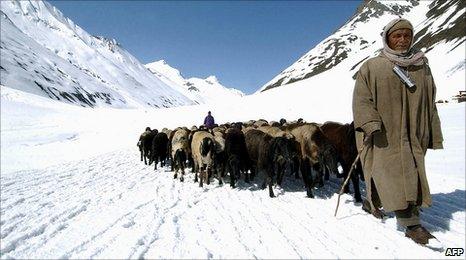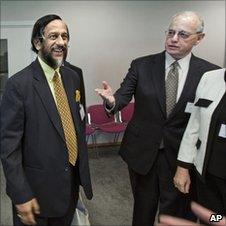Climate panel chief welcomes climate debate
- Published

The IPCC came under fire after using the wrong date for Himalayan glacier melt
The head of the Intergovernmental Panel on Climate Change, Rajendra Pachauri, says he welcomes "the development of a vigorous debate" on climate science.
In an article for the BBC's Green Room series, he says those on the side of "consensus" must remember that debate drives the evolution of knowledge.
The panel and its chairman have been much criticised in recent months over errors in its landmark 2007 report.
Tuesday sees the second public session of a review into its operations.
An expert review panel convened by the InterAcademy Council (IAC) - a network of science academies across the world, such as the UK's Royal Society - will hear testimony from four expert witnesses at the session in Montreal.
The panel is chaired by US economist Harold Shapiro, a former adviser to Presidents George Bush and Bill Clinton.
Dr Pachauri says the IPCC welcomes the review - indeed, it requested such a process, realising that as a 20-year-old institution, many of its practices might benefit from an update.
"As the scope of (its) findings has increased... it is inevitable that everything that the IPCC does is now under the lens of public scrutiny and criticism," he writes.
"This requires the panel to ensure a high level of transparency and objectivity in all that it does."
Broader view
Critics have accused the IPCC of making multiple errors in its 2007 Fourth Assessment Report (AR4), but Dr Pachauri admits to just one - citing 2035 as the date by which Himalayan glaciers may have melted away.
"It was, and is, inevitable that such an incident would lead to criticism and - quite rightly - to both internal and external examination," he writes.
"However, at times in the last six months it has become apparent that many people either do not know, or have forgotten, what the IPCC actually is: what it was formed to do, who it reports to, and what its current mandate is."
The remit goes much further than climate science, he points out, with the UN resolution that established the body in 1988 calling on it to "provide internationally co-ordinated scientific assessments of the magnitude, timing and potential environmental and socio-economic impact of climate change and realistic response strategies."
Giving testimony
Tuesday's session of the InterAcademy Council review will hear testimony from four people who have all worked closely with the IPCC down the years.
Robert Watson, now a senior UK government adviser, chaired the organisation between 1997 and 2002.

Dr Pachauri testified to Harold Shapiro's IAC panel in Amsterdam
Christopher Field, an ecologist based at Stanford University in California, now leads the working group on impacts, adaptation and vulnerability.
The other two speakers are Hans von Storch, director of the Institute of Coastal Research in Geesthacht, Germany, and John Christy, director of the Earth System Science Center at the University of Alabama, US.
Dr Christy, in particular, has criticised the IPCC's "politicisation" in the past.
Dr Pachauri presented his views at the opening session, held in Amsterdam last month.
The IAC panel will conclude its deliberations by the end of August. Its report will then go out for peer review before being formally presented at an IPCC meeting in South Korea in October - a meeting that will set parameters for the Fifth Assessment Report (AR5).
Dr Pachauri notes in his Green Room article that despite the intense, sometimes highly personal criticism aimed at climate scientists in recent months, about 3,000 have been nominated to take part in AR5 - more than ever before.
- Published14 May 2010